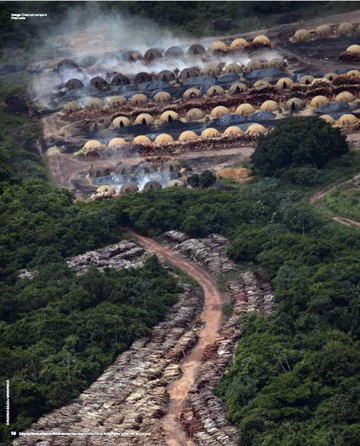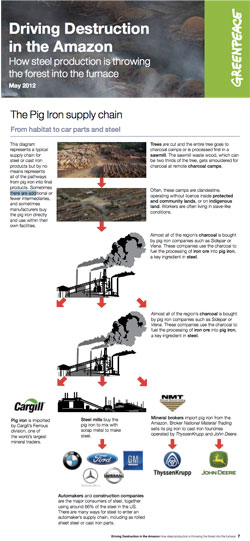Pig iron producers in the Brazilian state of Maranhão today pledged to stop using charcoal produced from Amazon rainforest logging, reports Greenpeace, which had waged a zero deforestation campaign targeting foreign automakers [PDF] that buy steel from the industry.
Greenpeace says the agreement commits pig iron producers to “eliminate Amazon deforestation from their supply chain and implement a monitoring system of charcoal used in their production processes.”
“This agreement by the industry is an important step forward for the protection of the Amazon and its people,” said Paulo Adario, Amazon Campaign Director of Greenpeace Brazil. “Strict criteria for how the charcoal is sourced will help ensure a pig iron supply chain free of deforestation, slavery and fraud.”
 Charcoal camps in Pará state. © RODRIGO BALÉIA / GREENPEACE |
Greenpeace says that the agreement moves Brazil a step closer to ending deforestation in the Amazon. The activist group has won similar concessions from the soy industry (2006) and major cattle processors (2009) following market campaigns.
Greenpeace is pushing for a “zero deforestation” law for the Brazilian Amazon and has persuaded some 400,000 Brazilians to sign a petition in favor of the measure.
Brazil has one of the world’s highest rates of forest loss, but annual clearing has declined nearly 80 percent in the Amazon since 2004. The reduction coincided with a period of strong economic growth. Environmentalists argue the trend shows that Brazil can grow its economy without the need to clear additional forest. The country is said to have more than 100 million hectares of degraded and underutilized cattle pasture that is suitable for agricultural expansion.
Related articles
Greenpeace lifts pig iron ship blockade in Brazil
(05/25/2012) Greenpeace suspended its blockade of a pig iron shipment in the Brazil after industry representatives and authorities agreed to meet to resolve issues raised in a recent report by the activist group.
U.S. car manufacturers linked to Amazon destruction, slave labor

(05/14/2012) According to a new report by Greenpeace, top U.S. car companies such as Ford, General Motors, and Nissan are sourcing pig iron that has resulted in the destruction of Amazon rainforests, slave labor, and land conflict with indigenous tribes. Spending two years documenting the pig iron trade between northeastern Brazil and the U.S., Greenpeace has discovered that rainforests are cut and burned to power blast furnaces that produce pig iron, which is then shipped to the U.S. for steel production.
Greenpeace makes social media push for zero deforestation in Brazil
(05/12/2012) Greenpeace is leveraging social media in its push for a zero deforestation target in Brazil.
How Greenpeace changes big business

(07/22/2010) Tropical deforestation claimed roughly 13 million hectares of forest per year during the first half of this decade, about the same rate of loss as the 1990s. But while the overall numbers have remained relatively constant, they mask a transition of great significance: a shift from poverty-driven to industry-driven deforestation and geographic consolidation of where deforestation occurs. These changes have important implications for efforts to protect the world’s remaining tropical forests in that environmental groups now have identifiable targets that may be more responsive to pressure on environmental concerns than tens of millions of impoverished rural farmers. In other words, activists have more leverage than ever to impact corporate behavior as it relates to deforestation. A prime example of this power is evident in a string of successful Greenpeace campaigns, which have targeted some of the largest drivers of deforestation, including the palm oil industry in Indonesia and Malaysia and the soy and cattle industries in the Brazilian Amazon. The campaigns have shared a common approach: target large, conspicuous consumer-facing companies that sell in western markets.
Concerns over deforestation may drive new approach to cattle ranching in the Amazon

(09/08/2009) While you’re browsing the mall for running shoes, the Amazon rainforest is probably the farthest thing from your mind. Perhaps it shouldn’t be. The globalization of commodity supply chains has created links between consumer products and distant ecosystems like the Amazon. Shoes sold in downtown Manhattan may have been assembled in Vietnam using leather supplied from a Brazilian processor that subcontracted to a rancher in the Amazon. But while demand for these products is currently driving environmental degradation, this connection may also hold the key to slowing the destruction of Earth’s largest rainforest.
